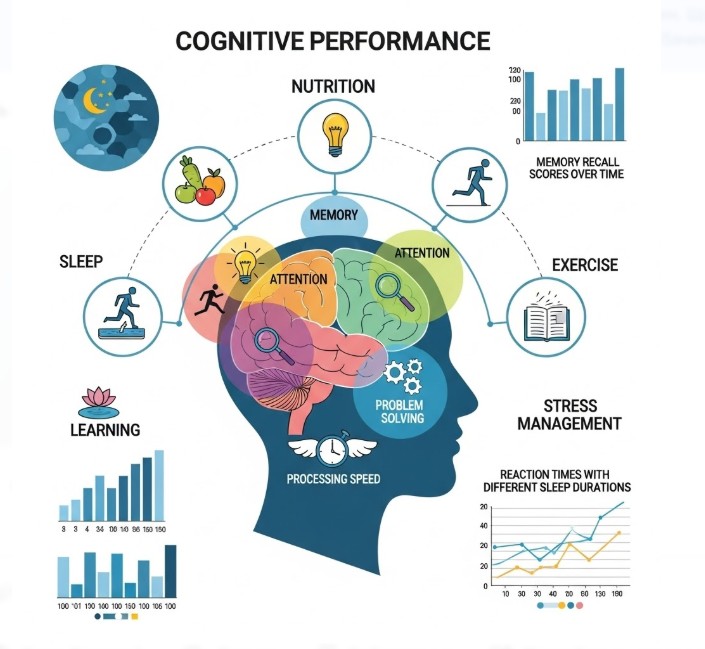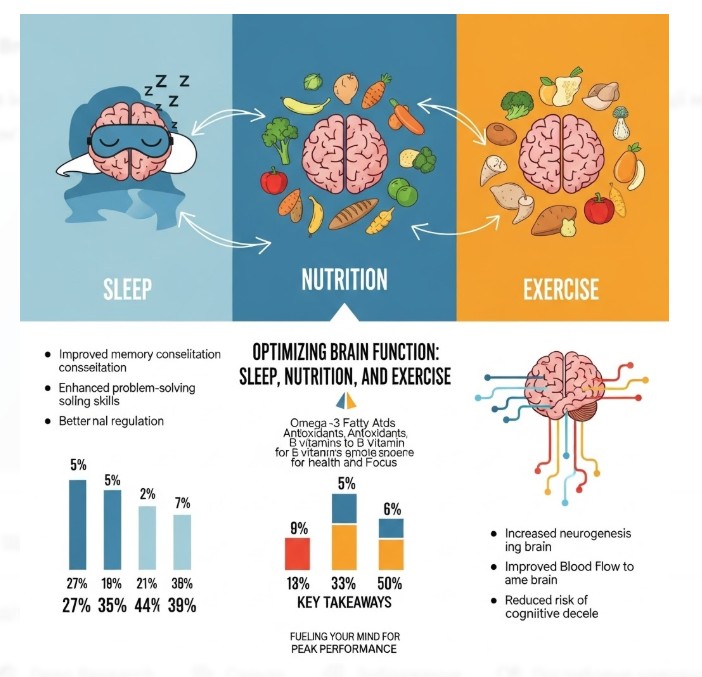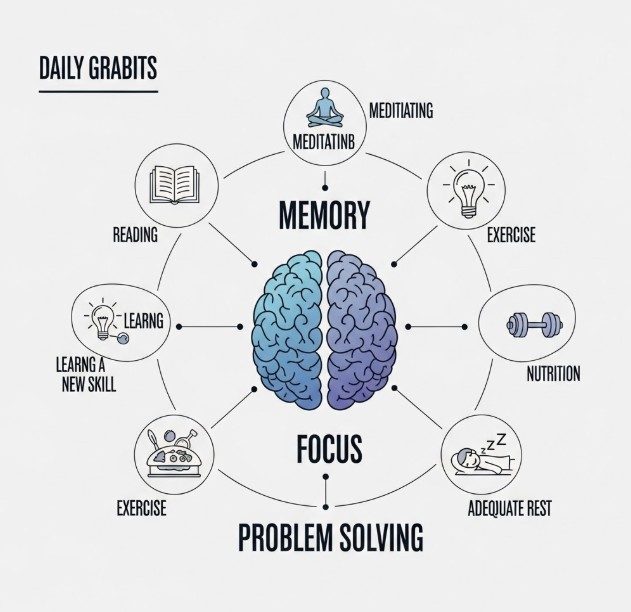
What is Cognitive Performance: Definition, Tests, and Effective Ways to Improve It
Table of Contents
Every human mind has a unique ability to process information, solve problems, and adapt to challenging environments. However, we take for granted the psychological processes—reasoning, decision-making, and memory encoding—that govern our daily lives. Knowing a measure of how well our brain functions is not just an intellectual activity; it’s the beginning of improving those abilities. To enhance them, we must be aware of the building blocks of cognitive functioning, determine our strengths and deficits, and apply proven improvement strategies. Thus, it would be fair to say that everything begins with awareness.
What Is Cognitive Performance?
What is cognitive performance? It is the speed and accuracy of the brain in executing mental functions. It includes various abilities, like attention, memory, processing speed, reasoning, and problem-solving. Yes, some are born with phenomenal capacities, for example, record breakers for the highest IQ ever recorded. However, cognitive performance is not fixed. It can be measured, trained, and optimized through deliberate effort.
Core Cognitive Performance Areas
Several vital areas influence how well the brain works. Attention functions as an ability to concentrate on the relevant information without distractions. Memory allows short-term encoding for instantaneous activity and long-term storage of acquired knowledge. Processing speed quantifies the degree to which the brain comprehends and responds to input data. Reasoning and problem-solving fuel the ability to analyze a situation. These are not isolated areas; strengthening one enhances the other, forming a more nimble and resilient mind.
Why It Matters for Everyday Life and Work
Cognitive ability differs in the extent to which we learn new skills, adapt to change, and perform under pressure. Educationally, it influences learning and performance. For students, it gives a chance to reach academic success. At work, it differs in productivity, creativity, and leadership ability. Optimizing cognitive performance is, therefore, an investment, personal and professional, with long-term rewards.
Factors Affecting Cognitive Performance

Quality of Sleep
Sleep quality has a strong and direct effect on brain performance and efficiency. REM and deep stages are where the brain files away memories, processes emotional experiences, and removes metabolic waste. Inadequate or fragmented sleep results in a shorter attention span, delayed response times, and impaired decision-making. It is for this reason that even the most mind-stretching information cannot be processed best when one is fatigued.
A thoroughly cultivated system of routine sleep mechanisms toughens up mental resilience, allowing an individual to work on information and memories more precisely. Students, working adults, and lifelong learners must not consider refreshing sleep as a desire, but as an intellectual foundation.
Nutrition and Hydration
The brain needs a lot of energy to work well; thus, it needs a regular supply of glucose, vitamins, and water. A poorly designed diet may slow down the action of neurotransmitters, and dehydration can slowly make it harder to concentrate and comprehend information.
Omega-3 fatty acids, antioxidants, and B vitamins included in food help the brain work better by keeping cells healthy and making sure that nerve signals get through.
Staying hydrated keeps your mind sharp, as even a small loss of fluids can impair cognitive performance. In today’s environment, when data is everything, it’s essential to maintain the right combination of meals and drinks, which has a direct influence on how sharp your mind is.
Physical Activity
Physical activity is not just about having strong muscles—it also serves to keep the mind spry. Exercise circulates blood to the brain, delivering oxygen and nutrients to power neural efficiency. Exercise also promotes the production of brain-derived neurotrophic factor (BDNF), a protein that facilitates learning, memory, and mental energy. Aerobic exercise, strength exercise, or even focused stretching—consistency with exercise is a tactical step to maintain physical and mental stamina in the constantly changing landscape of life.
Stress and Mental Health
Chronic stress overwhelms the body with cortisol, a hormone that, in the long term, can damage brain structures that govern memory and emotional regulation. Anxiety, depression, and burnout further erode concentration and problem-solving. Thus, focus improvement is impossible without internal emotional and mental balance.
Mindful work environments, mindfulness training, and adequate workloads can manage stress’s damaging power effectively. Working with mental health is not about quick fixes. It’s about consistent, intentional effort to maintain optimal cognitive performance. A balanced mind is better positioned to adapt, innovate, and tackle complicated challenges.
How to Test Cognitive Performance
Recognition of mental abilities begins with formal testing. A cognitive performance test assesses specific areas, including memory, focus periods, response time, and reasoning ability. These are tested formally, generally by a cognitive performance specialist, or accomplished through proven digital interfaces. The goal is not to provide a permanent score but to get a baseline that makes it easier to track progress over time.
Types of Tests
Several types of tests are used to evaluate different characteristics of thinking. Memory tests evaluate immediate and delayed recall, attention tests measure sustained attention and resistance to distractions, reaction time tests evaluate how quickly a person can process and respond to stimuli, and problem-solving tests evaluate logical reasoning and flexibility. All together, these measures paint a multi-dimensional picture of cognition.
Examples of Online Cognitive Performance Tests
Thanks to technological innovation, it is possible to get high-quality test results without ever visiting a testing site. Most cognitive performance test options have interactive examples that simulate common problems. For example, a working memory task might include remembering a list of items while solving real-world problems, and an attention test might simulate the divided attention found in a busy online work setting. While Internet testing is useful to learn more about your mental sharpness, results are of most value when read and interpreted with the aid of a professional.
Reading Test Scores
Results and scores on any test need to be taken as clues, not as absolute labels. A temporary dip in performance may be explained by lost sleep, unhealthy food, or high stress levels. Conversely, improvements typically reflect lifestyle changes, special practice, or more familiarity with test patterns.
The role of interpretation is to identify patterns over time, pointing individuals towards actions that strengthen weaker areas. Testing, therefore, becomes an ongoing instrument of growth, enabling every individual to deal with the evolving nature of life with enhanced capability and confidence.
What a Cognitive Performance Specialist Does

A cognitive performance specialist is a trained professional who focuses on evaluating, measuring, and improving brain functions in different contexts. They have a professional background in neuroscience, psychology, and performance coaching. They can create personalized plans that respond to individual cognitive needs.
Evaluating an individual’s mental capacity through formal exams and their lifestyle is the first step. The findings inform a strategy approach to enhance the learning process, refine concentration, and cultivate resilience against mental weariness. This method isn’t just for academics; it can also help you be more productive at work, come up with creative solutions to problems, and even do well in sports, where mental balance may be just as crucial as physical ability.
When to Get Professional Help
Anyone may benefit from knowing the answer to “what is cognitive performance?” and using self-help techniques, but there are times when getting assistance from an expert is the best thing to do. Continual brain fog, ongoing memory loss, or a blatant drop in focus might be signs of health problems that are caused by physiological, psychological, or environmental reasons.
Professionals may also help individuals who are getting ready for exams, business leaders who have to make tough choices, and those who have survived brain injuries. A cognitive performance specialist knows how to find hidden weaknesses, remove obstacles to mental advancement, and use strengths for peak performance. Getting aid from an expert is not a sign of weakness; it’s a smart move to keep your mind sharp in the face of the changing demands of contemporary life.
Ways to Get the Most Out of Your Brain’s Performance
Exercises for Brain Training
There is substantial evidence that directed mental training improves some areas of cognition. The brain becomes better at working memory training or logical difficulties. For those who appreciate organized learning tools, an improved memory app may provide them with daily instruction that fits into their busy lives.
The mind palace technique, in which information is mentally stored in imagined spatial locations, is a powerful way to enhance memory because it activates several parts of the brain at once. These strategies work because they not only make patterns that are already in the brain, but they also make new ones by stimulating neuroplasticity. This is the mechanism that lets patterns emerge in the brain. Training your mind keeps it from aging and maintains long-term improvements.
Changes in Lifestyle and Good Habits
Mental resilience cannot be cultivated just via individual exercises; it thrives within the framework of a healthy, balanced lifestyle. The biological foundation for brain function includes getting enough sleep, eating well, drinking enough water, and exercising. It’s also important to reduce stress.
Mindfulness meditation, breathing, and even scheduled breaks are all ways to get your mind back in balance. Social engagement is also important since meaningful talks keep your brain’s circuits fresh and flexible. These changes to one’s lifestyle make it easier to keep up top performance, and the brain becomes more flexible and resistant to the ever-changing nature of life.
Apps and Technology
Technology helps our minds expand in today’s environment. When used correctly, computer-based tools may be quite helpful for improving your mental skills. Apps for mental efficiency are custom-made apps that provide users with structured workouts that adapt to their current level, creating a unique route to improvement.
There are even some apps that enable users to track their own improvement so that they can observe how their memory, logic, and concentration increase in the long run. Not every piece of software is the same, however, so choosing ones based on study is essential. The superior software programs get the brain performing the way it would when individuals solve problems in daily life. Technology supports learning and ongoing mental growth, while also helping you make informed decisions about how you live your life.
The relationship between professional supervision, everyday mental training, a healthy lifestyle, and proper utilization of technology to maintain peak mental acuity demonstrates that mental functions can be monitored and optimized. The human brain is plastic and continues to function effectively with regular exercise, good sleep, and new challenges.
It needs persistence and flexibility to develop your brain potential. This may be done alone or with the help of a specialist. By doing these things, individuals not only improve their current skills but also protect their mental health in older age.
Conclusion
Cognitive performance is not a stable characteristic; rather, it is a dynamic attribute influenced by lifestyle, cognitive fitness, and deliberate interventions. When you know what cognitive functioning is, you can understand it as more than simply book smarts. It is the basis for learning, problem-solving, creativity, and being able to change.
Sleep, diet, stress management, and certain workouts are just a few of the things that affect it. These things all need to be in a careful balance. A cognitive performance specialist may help you find hidden potential for improvement, and technology can help you make progress and keep it up over time if you choose it carefully.
Starting Today
Becoming aware and taking action on purpose are the first steps to growing cognitive function. To begin, it is important to identify your existing strengths and weaknesses with the use of credible self-assessment tools. After that, be sure to include everyday practices that keep your mind healthy, including getting healthy sleep, eating smartly created meals, drinking enough water, and working out regularly.
Include things that challenge your mind in your life, such as brain training exercises and creative hobbies that push your brain. Do it slowly and steadily, knowing that every action you do with purpose strengthens your mind. The sooner, the better. The sooner you start, the sooner you’ll have better wits, deeper concentration, and more mental strength. These are skills that will help you in all areas of your life.